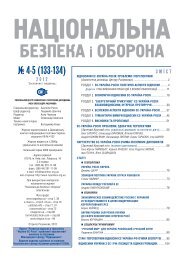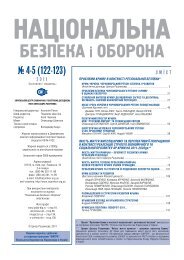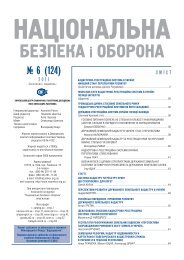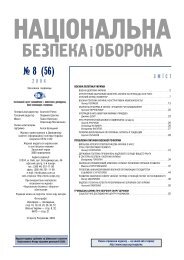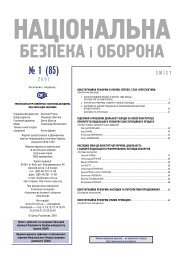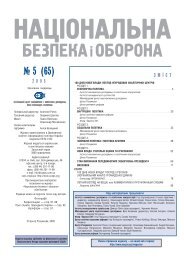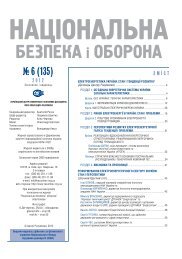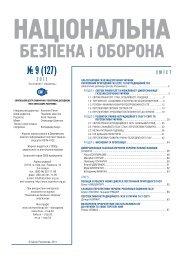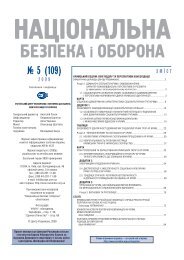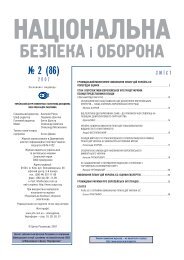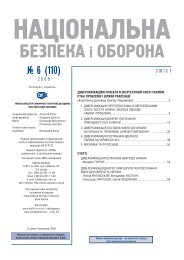RUSSIA THE EURASIAN CUSTOMS UNION AND THE EU COOPERATION STAGNATION OR RIVALRY?
RUSSIA, THE EURASIAN CUSTOMS UNION AND THE EU ...
RUSSIA, THE EURASIAN CUSTOMS UNION AND THE EU ...
- No tags were found...
Create successful ePaper yourself
Turn your PDF publications into a flip-book with our unique Google optimized e-Paper software.
<strong>RUSSIA</strong>, <strong>THE</strong> <strong><strong>EU</strong>RASIAN</strong> <strong>CUSTOMS</strong> <strong>UNION</strong> <strong>AND</strong> <strong>THE</strong> <strong>EU</strong>: <strong>COOPERATION</strong>, <strong>STAGNATION</strong> <strong>OR</strong> <strong>RIVALRY</strong>?<br />
Russia may take extra-legal measures in contradiction of<br />
WTO rules. Ultimately, it is difficult for Ukraine to make<br />
a choice based on a prediction of Russia’s propensity<br />
to violate the norms of the organization it has recently<br />
joined. Russia’s campaign in Ukraine in Ukraine has<br />
highlighted a sense of uncertainty and confusion among<br />
various political and, especially, economic players in<br />
Ukraine, given the importance of the Russian market for<br />
Ukrainian industrial goods and food produce.<br />
Is the ECU a vehicle for European integration?<br />
The ECU is being presented by Russia as an optimal<br />
economic choice for Ukraine. 17 At the same time, it is<br />
argued that membership of the ECU will bring other<br />
benefits. In particular, it is presented as a scheme that<br />
in the long term would facilitate Ukraine’s integration<br />
with the <strong>EU</strong> by reducing essential asymmetries. As Putin<br />
put it: “Soon the Customs Union, and later the Eurasian<br />
Union, will join the dialogue with the <strong>EU</strong>. As a result,<br />
apart from bringing direct economic benefits, accession to<br />
the Eurasian Union will also help countries integrate into<br />
Europe sooner and from a stronger position”. 18<br />
In essence, the argument is that Ukraine could “join”<br />
Europe faster and on better terms if it does so “together<br />
with Russia”. However, the prospect for concluding a<br />
comprehensive agreement between Russia/ECU and the<br />
<strong>EU</strong> are remote.<br />
Nevertheless, the campaign complicates Ukraine’s<br />
already difficult relations with the <strong>EU</strong>, especially with<br />
regard to democratic standards. It is worth stressing<br />
that the ECU is free of democratic conditionality for the<br />
current and prospective member states. Ukraine is offered<br />
membership with no political conditions attached: all<br />
post-Soviet countries, regardless of their political regime,<br />
are welcome in the ECU. Russia’s offer to Ukraine comes<br />
at a highly sensitive moment in Ukrainian-<strong>EU</strong> relations and<br />
thereby counteracts the <strong>EU</strong>’s democratic conditionality.<br />
The campaign to persuade Ukraine to abandon the<br />
DCFTA could be seen as a short-lived attempt to attract<br />
the country at a time when the authorities have declared<br />
their interest in concluding the Association Agreement<br />
rather than opting for the ECU. No doubt, the pull of the<br />
ECU is weakened by the prospect of paying compensation<br />
in the process of renegotiating the tariffs agreed when<br />
Ukraine joined the WTO. However, this is not just<br />
a matter of a short-term choice but also a longer-term<br />
contestation.<br />
Even if the Association Agreement is signed and<br />
ratified, its implementation will be prolonged, costly and<br />
highly sensitive in political and economic terms. There are<br />
different preferences and stakes among Ukraine’s domestic<br />
political and business players, many of whom have a strong<br />
interest in securing access to the ECU market. At the same<br />
time, Ukraine has a track record of signing international<br />
agreements but not implementing them. 19 Andriy Kluyev,<br />
an oligarch and Ukraine’s chief negotiator on the<br />
Association Agreement, said in the spring of 2011 that<br />
“Ukraine would participate in such economic unions from<br />
which it may benefit, such as cooperating on certain trade<br />
positions, while it would be more beneficial to be part of<br />
a free trade area with the <strong>EU</strong> on some other issues”. 20 These<br />
statements demonstrate the continuing preference for a<br />
selective and flexible approach to economic integration<br />
that Ukraine has demonstrated over the last 20 years.<br />
Such a context provides plenty of opportunities for<br />
Russia to offer incentives and disincentives to various<br />
domestic Ukrainian players to slow down or jeopardize<br />
the implementation of the Association Agreement and<br />
other commitments vis-à-vis the <strong>EU</strong> (such as those<br />
related to Ukraine’s membership in the European Energy<br />
Community). Integration with the <strong>EU</strong> is certainly premised<br />
on the lengthening of the time horizons of Ukraine’s<br />
political class. These longer time horizons are needed to<br />
embark on political and economic reforms that would<br />
generate benefits in the medium to long term (5-10 years).<br />
Russia is well positioned to offer cross-conditionality<br />
to alter the stakes and shorten the horizons.<br />
Conclusion<br />
As widely noted, the notion of global competition –<br />
economic, military and normative – resonates strongly<br />
among the Russian political elites. A corollary of Russia’s<br />
aspirations to “great powerness” is its claim to hegemony<br />
in the “near abroad”. Much doubt has been cast on its<br />
status as a rising power. To dispel these doubts, Russia<br />
has shifted its focus to a legal, rule-based domain of<br />
integration. This has no doubt been inspired by the <strong>EU</strong>’s<br />
increased presence in the “shared neighbourhood” and<br />
facilitated by Russia’s accession to the WTO.<br />
While <strong>EU</strong>–Russian relations have remained static<br />
since mid-2000s, the same cannot be said about their<br />
respective relations with the countries in the “common<br />
neighbourhood”. To prevent its loss of influence across<br />
the post-Soviet space, Russia has opted for reviewing its<br />
approach to regional integration by putting a premium on<br />
rule-based economic integration with robust institutional<br />
regimes. It is highly uncertain whether this rapid pace<br />
can be maintained to keep up with the declarations on the<br />
creation of the Eurasian Economic Union by 2015. Much<br />
of the progress so far has undoubtedly been dependent<br />
on the personalities of the leaders in the three countries,<br />
making the union vulnerable to any leadership changes.<br />
Thus, expansion, especially to Ukraine, would significantly<br />
strengthen the union politically and economically (while<br />
the accession of Kyrgyzstan and Tajikistan would have<br />
mainly symbolic political value).<br />
The already proven viability of the ECU means that<br />
the <strong>EU</strong> is no longer the only source of effective<br />
governance in the region and Russia has moved into a<br />
domain in which the <strong>EU</strong> so far has not been challenged.<br />
This shift has multiple and far-reaching implications, not<br />
least because Russia explicitly presents the ECU as an<br />
alternative to <strong>EU</strong>-led economic integration, capitalizing<br />
on the <strong>EU</strong>’s political and economic crisis.<br />
The most immediate threat stems from competition<br />
over Ukraine. This rivalry between Russia and the<br />
<strong>EU</strong> is unlikely to cease even if and when Ukraine<br />
actually concludes the Association Agreement. Its<br />
implementation will be a costly and prolonged process<br />
with ample opportunities for delays and, not least given<br />
the unfavourable domestic context in Ukraine. Ukraine’s<br />
dependence on the Russian market means that the country<br />
will have to adapt simultaneously to two competitive<br />
integration regimes, the <strong>EU</strong> and the ECU.<br />
•<br />
17<br />
Overall, in the short term, there would indeed be higher initial costs for Ukraine associated with joining the DCFTA in contrast to the ECU. In the longer<br />
term, however, the DCFTA is expected to significantly boost Ukraine’s trade and economic development while reducing dependence on Russia.<br />
18 Putin, V. (2011).<br />
19<br />
On agreements with the <strong>EU</strong>, see Langbein, J. and Wolczuk, K. (2012) ‘Convergence without Membership? The Impact of the European Union in the<br />
Neighbourhood: Evidence from Ukraine’, Journal of European Public Policy, Vol.19, No.6.<br />
20 Korduban, P. (2011) ‘Ukraine Sends Mixed Signals on Free Trade with The <strong>EU</strong>, Russia’ Eurasia Daily Monitor, Vol.8, No.62, March 30, Category: Eurasia Daily<br />
Monitor, Home Page, Europe, Ukraine, Foreign Policy, Economics.<br />
RAZUMKOV CENTRE • NATIONAL SECURITY & DEFENCE • №4-5, 2013 • 97



